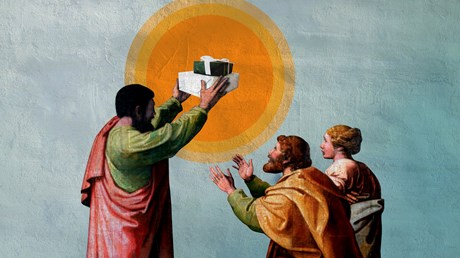Theologian John Barclay distills and updates his game-changing study of God’s “incongruous” grace in Christ.

In an early episode of NBC’s sitcom The Office, corporate America boss-extraordinaire Michael Scott hosts a Secret Santa party for his employees. Each person is supposed to bring a gift of not more than $20 to exchange with another. But Michael, wanting to add some spice to the evening, brings a $400 video iPod (remember those?). Wearing a lopsided Santa hat, Michael explains his rationale: “[A gift… it’s] like this tangible thing that you can point to and say, ‘Hey man, I love you this many dollars’ worth.’”
I often use that illustration with my students when I try to help them reflect on the complications of gift giving. Is it any wonder, I ask them, that a gift like Michael’s caused his Secret Santa party to descend into chaos? (You’ll have to watch the “Christmas Party” episode to see the sad, hilarious debacle.) At one level, it’s just a gift and shouldn’t be expected to surprise anyone, least of all at a Christmas party. We all know the choreography of exchanging presents. And yet, by giving a gift out of all proportion with the rules of the game, Michael not only disrupts the social equilibrium of the office he manages but also raises questions for us, the viewers, about what counts as an appropriate gift—and what criteria we might use to warrant our answer.
A Long-Running Conversation
We sitcom viewers are hardly the first ones in history to wonder about best practices when it comes to giving and receiving gifts. Throughout antiquity, philosophers, dramatists, orators, and others were engaged in a lively conversation about gifts.
The early first-century Stoic philosopher Seneca, to choose just one exemplar, dispensed definite opinions ...
from Christianity Today Magazine
via


.gif)

.gif)
.gif)
